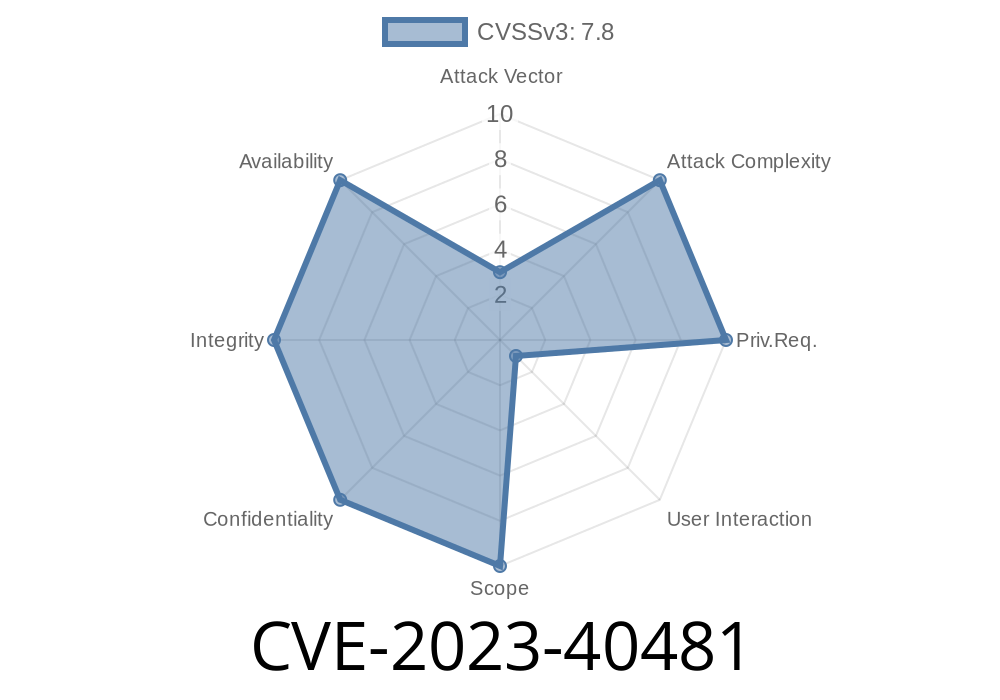7-Zip is one of the most popular free and open-source file archivers used worldwide for compressing and decompressing files in various formats. However, like any complex software, 7-Zip can have vulnerabilities that criminals may exploit.
In this long read, we’ll break down CVE-2023-40481—a serious security flaw in 7-Zip’s handling of SquashFS files (the .sqfs format). This vulnerability may allow remote attackers to execute code on a victim’s computer simply by tricking them into opening a malicious file or visiting a booby-trapped website.
We’ll cover the root cause, walk through the vulnerability with a simplified code example, and discuss exploitation. You’ll also find key references if you want to go deeper into the technical details.
What is CVE-2023-40481?
CVE-2023-40481 (also known as ZDI-CAN-18589) is an out-of-bounds write vulnerability in 7-Zip’s parsing of SquashFS files. This vulnerability was responsibly disclosed via the Zero Day Initiative.
Impact: Remote Code Execution (RCE)
- User Interaction: Required (user must open a malicious .sqfs file or visit a malicious webpage)
- CVE Details: NIST CVE-2023-40481
- ZDI Advisory: ZDI-23-1503
A Simple Explanation
When 7-Zip parses a SquashFS file, it reads metadata and file contents into memory buffers. The vulnerable code *does not properly check* that the data from the file fits within the buffer. If an attacker crafts a malformed SquashFS file with oversized data, 7-Zip may write that data past the end of the buffer—corrupting memory.
Let’s look at a simplified version of the vulnerable routine in C++-like pseudocode
void parseSquashFSHeader(const uint8_t* data, size_t len) {
uint8_t buffer[64];
// ... some code ...
size_t header_length = extractHeaderLength(data); // attacker controlled
// Vulnerable code: no bounds check for 'header_length'
memcpy(buffer, data, header_length); // Can overwrite buffer
// ... further processing ...
}
If header_length is larger than 64, memcpy will write past the buffer, potentially overwriting other memory. An attacker can control both the content (data) and the size (header_length).
The issue: 7-Zip doesn't properly verify that header_length fits in buffer.
Exploit Scenario: Remote Code Execution
A crafted SquashFS file, when opened in 7-Zip, can hijack the program’s execution flow, ultimately running attacker-supplied code.
The attacker creates a malicious .sqfs file with a specially crafted header.
2. The attacker emails this file to the victim or hosts it on a website, persuading the victim to open it.
The attacker’s payload (e.g., shellcode) is executed within the context of 7-Zip.
No privilege escalation occurs by default, but if the user has high privileges, so does the payload.
Proof-of-Concept (PoC) Snippet
Here’s a hypothetical PoC (don’t run this on a production system!) showing how you might trigger an OOB write in a vulnerable parsing routine:
with open("exploit.sqfs", "wb") as f:
f.write(b"SQSH") # Magic bytes for SquashFS
f.write(b"\xFF" * 256) # Overlong "header" to trigger overflow
# (In reality, you’d need to follow the SquashFS file structure)
Opening exploit.sqfs in an unpatched 7-Zip could crash the program or, if the payload is correct, execute attacker code.
Mitigation and Recommendations
Vulnerable Versions: Look for your version’s status here.
Patch Status: Check 7-Zip’s official site for the latest fixed releases.
References and Further Reading
- ✉️ Zero Day Initiative ZDI-23-1503
- 🐞 NIST’s CVE-2023-40481 Detail Page
- 📦 7-Zip Official Download
- 🧑💻 SquashFS Format Documentation
Conclusion
CVE-2023-40481 shows that even trusted, widely-used utilities like 7-Zip can harbor dangerous flaws. Out-of-bounds write bugs like this are a top target for attackers because they can turn simple file parsing into remote code execution.
Action Step: Update your 7-Zip today, don’t open suspicious files, and stay on top of security news!
Have questions or want a demo PoC? Let us know in the comments. Stay safe!
Timeline
Published on: 05/03/2024 03:15:21 UTC
Last modified on: 06/05/2024 20:02:31 UTC
